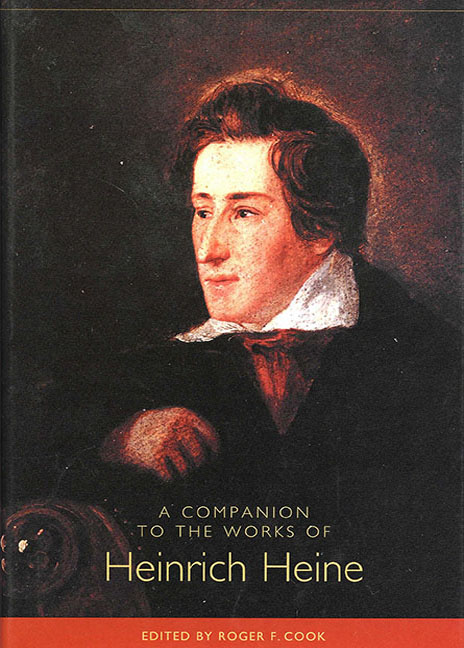Book contents
- Frontmatter
- Contents
- Acknowledgments
- Chronology of Heine's Life
- Heine's Major Works
- List of Abbreviations
- Introduction
- The Romantic Poet
- Philosophy, History, Mythology
- Religion, Assimilation, and Jewish Culture
- Modernity: Views from the Poet's Crypt
- Reception in Germany
- Notes on the Contributors
- Index
Introduction
Published online by Cambridge University Press: 29 July 2017
- Frontmatter
- Contents
- Acknowledgments
- Chronology of Heine's Life
- Heine's Major Works
- List of Abbreviations
- Introduction
- The Romantic Poet
- Philosophy, History, Mythology
- Religion, Assimilation, and Jewish Culture
- Modernity: Views from the Poet's Crypt
- Reception in Germany
- Notes on the Contributors
- Index
Summary
Heinrich Heine came into the world in 1797, at the beginning of Napoleon's rise to power, which would shake the foundations of European society, and by his death in 1856 Heine's life had spanned a transitional period in German history stamped by hope, disillusionment, anticipation, and suspended action. His generation inherited a dying system of social structures and cultural values without possessing a clear vision of either the political or the social order that could replace it. In this state of limbo on the threshold to modernity, the new generation of German Dichter und Denker were torn between a turn back to glorified visions of the past and a radical break with even the most revered traditions. No other German writer reflected this ambivalence as deeply as Heine. The richness and diversity of his writings is itself a testament to the vacillations that characterize German culture during his lifetime.
Heine was the oldest of four children born to Samson and Betty Heine in Düsseldorf. His father ran a yard-goods business that slowly deteriorated in the weak economic climate of the early Restoration period, until it finally collapsed in 1819. After two years in a communal Hebrew school, where he learned a smattering of Hebrew, Heine began attending Catholic schools in 1804, which at the time were structured according to the French system. He was a student at the Lyceum in Düsseldorf from 1810 until 1814, when he dropped out before graduation in order to prepare for a career in business.
However, coming of age in a time when Romantic poetry was considered the most genuine form of literary expression, and indeed even the mark of genius, Heine embraced it as his calling in his late teens. He continued to write Romantic verse even while his uncle Salomon, a wealthy Hamburg banker, supported him through halfhearted attempts to help revive the failing family business and then financed his university studies in law. As his poems began to appear in journals and then in a first published collection (entitled simply Gedichte, 1821), he established something of a reputation for himself as one of the best young Romantic poets.
- Type
- Chapter
- Information
- A Companion to the Works of Heinrich Heine , pp. 1 - 34Publisher: Boydell & BrewerPrint publication year: 2002

